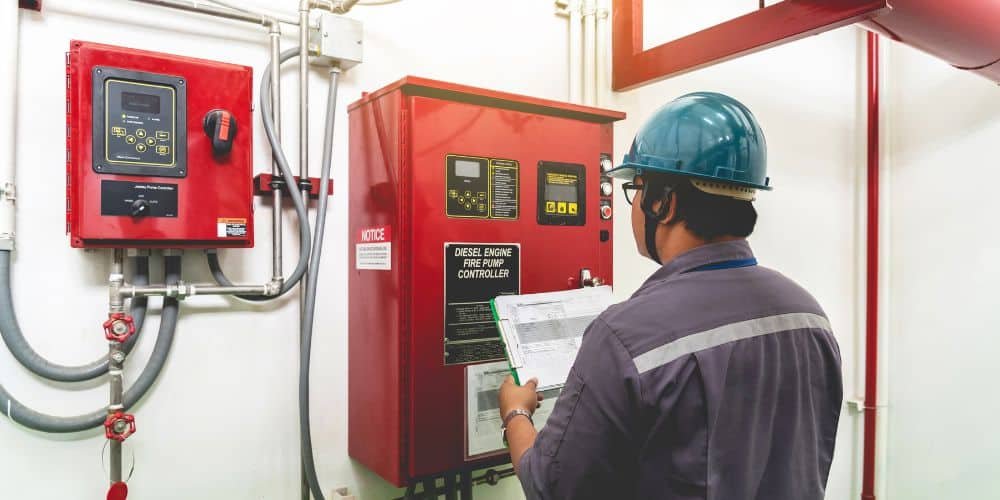fire alarm control panel
The Importance of a Fire Alarm Control Panel in Commercial and Residential Properties
A fire alarm control panel is the heart of any fire safety system. It ensures quick detection and response during emergencies. This essential device manages various fire alarms and sensors to protect your property. It remains functional even during power outages with a reliable alarm control panel battery, Regular maintenance of your control panel fire alarm is crucial for continuous protection. A strong fire alarm control panel is key to keeping everyone safe for both commercial buildings and residential properties. A strong alarm control panel is key to keeping everyone safe and secure. That’s why Investing in a quality system can save lives and prevent significant property damage.

Understanding What is Fire Alarm Control Panel
A fire alarm control panel is a central device that monitors and controls various fire alarms and sensors in a building. It detects fire incidents and activates alarms to alert occupants and emergency services. The alarm control panel ensures rapid detection and response. It also helps to minimize potential damage. Modern fire alarm control panels are equipped with advanced features such as zoning capabilities. This zoning feature allows to identification of the fire’s location. This enables quicker and more effective responses from emergency personnel. Additionally, many fire control panels can integrate with other building management systems, such as HVAC and sprinkler systems. Overall It provides a comprehensive safety solution.
Key Features of Alarm Control Panel
To understand what is the Alarm control panel you have to understand the key features of the Alarm control panel. Some of the Key features are given below:
- Centralized Monitoring: A fire alarm control panel continuously monitors all connected fire alarms and sensors. It promptly detects any malfunctions, guaranteeing that your fire safety system is always ready to protect.
- User Interface: Modern alarm control panels have user-friendly interfaces. These make it easy for building managers to access the system, and diagnostics and receive real-time alerts. These simple controls ensure that technical expertise can manage the system effectively.
- Battery Backup: Battery backup is one of the essential features of any control panel fire alarm. This battery makes sure that the system remains operational even during power outages. This continuous protection is vital for maintaining safety at all times.
- Zoning Capabilities: Fire alarm control panels can divide a building into multiple zones. This zoning capability helps to identify the exact location of a fire and it enables quicker response times.
- Alarm History and Reporting: Most alarm control panels come with the ability to log alarm events and generate reports. This feature is useful for identifying patterns, conducting fire drills, and ensuring compliance with safety regulations.
- Expandability: Fire alarm control panels are often designed with expandability in mind. If your building grown or your safety needs change then you can easily add more alarms without requiring a complete overhaul.
- Remote Monitoring and Control: Many modern fire alarm controls offer remote monitoring and control features. This feature allows building managers to check the status of the fire alarm system and perform necessary actions from anywhere. It offers more comfort and assurance.
- Integration with Other Systems: Advanced fire alarm control panels can integrate with other building management systems such as HVAC, elevator control, and sprinkler systems. This integration makes sure that emergency responses are coordinated. It improves overall safety and efficiency.
Different Types of Alarm Control Panels
Choosing the right fire alarm control panel is very important. There are various types of control panels. If you understand these differences it will help you to make an informed decision.
1. Conventional Fire Alarm Control Panels
A conventional fire alarm control panel is ideal for smaller buildings. It connects multiple fire alarms and devices to specific zones. These cost-effective panels make it easy to identify the general location of a fire. However, pinpointing the exact spot can be challenging. These panels are easy to install and maintain.
2. Addressable Fire Alarm Control Panels
Addressable fire alarm control panels are more advanced and suitable for larger buildings. Each device connected to the control panel fire alarm has a unique address. It allows the system to identify the exact location of a fire. This precision helps in quicker response times and efficient evacuation. Though these panels are expensive but they offer superior functionality and reliability.
3. Wireless Fire Alarm Control Panels
Wireless fire alarm control panels are perfect for buildings where wiring is difficult or not possible. These systems use radio signals to communicate between the control panel and the fire alarms. They are easy to install and highly flexible which is why ideal for historic buildings or temporary structures.
4. Hybrid Fire Alarm Control Panels
Hybrid fire alarm control panels combine the best features of conventional and addressable systems. They allow for both wired and wireless connections and it provides flexibility. This type of control panel is suitable for buildings with mixed requirements.
FAQS about Fire Alarm Control Panel
How to install a fire alarm control panel?
Ans: Installing the control panel typically involves mounting the panel on a wall, connecting it to power, and wiring it to the fire alarms. It is important to follow the manufacturer’s instructions and comply with local safety regulations. It is recommended to hire a professional installer for best results.
How to make a fire alarm control panel?
Ans: Creating a alarm control panel requires technical knowledge of electronics and fire safety systems. It involves designing a circuit that can receive signals from fire alarms and sensors, process these signals, and activate alarms. Purchasing a pre-made, certified control panel is safer and more reliable for most people.
Where is the fire alarm control panel located?
Ans: The fire alarm control panel is usually located in a secure, accessible area such as a control room, near the main entrance, or in a designated fire safety room. In an emergency situation, this placement ensures that building managers and emergency responders can quickly access it.
How does a fire alarm control panel work?
Ans: A fire alarm control panel works by continuously monitoring connected fire alarms and sensors. It sends a signal to the control panel when a sensor detects smoke or heat. The panel then processes the signal and activates the building’s alarm system to alert occupants.
How to build a fire alarm control panel?
Ans: Building a fire alarm control panel requires designing and assembling a system that includes a power source, circuit board, input devices (like smoke detectors), and output devices (like alarms). It is recommended to use commercially available systems. Additionally, you can consult with experts due to this complexity.
What does a fire alarm control panel do?
Ans: A fire alarm control panel monitors various fire detection devices and alarms within a building. It makes sure that all connected devices are functioning properly and processes incoming signals from sensors. It activates alarms to alert occupants of potential fire hazards.
How to reset a fire alarm control panel?
Ans: To reset a fire alarm control panel, first you have to ensure that the cause of the alarm has been addressed. Then press the reset button or switch on the control panel or follow the manufacturer’s instructions. Some systems may require entering a code or performing a series of steps to complete the reset.
Conclusion
A fire alarm control panel is essential for any comprehensive fire safety system. It ensures timely detection and response during emergencies. If you understand the different types of control panel fire alarms and features, you can choose the best option for your building’s needs. Regular maintenance of the alarm system is very important. It includes checking the alarm control panel battery. Investing in a reliable alarm control panel improves safety and compliance with regulations for both commercial and residential properties. So stay proactive in maintaining your fire alarms and control panel to ensure a safe environment for all occupants.
